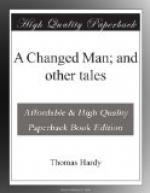Years and years Nic walked that way, at this interval of three days, from his house in the neighbouring town; and in every instance the aforesaid order of things was customary; and still on his arrival the form of words went on—’He has not come?’
‘He has not.’
So they grew older. The dim shape of that third one stood continually between them; they could not displace it; neither, on the other hand, could it effectually part them. They were in close communion, yet not indissolubly united; lovers, yet never growing cured of love. By the time that the fifth year of Nic’s visiting had arrived, on about the five-hundredth occasion of his presence at her tea-table, he noticed that the bleaching process which had begun upon his own locks was also spreading to hers. He told her so, and they laughed. Yet she was in good health: a condition of suspense, which would have half-killed a man, had been endured by her without complaint, and even with composure.
One day, when these years of abeyance had numbered seven, they had strolled as usual as far as the waterfall, whose faint roar formed a sort of calling voice sufficient in the circumstances to direct their listlessness. Pausing there, he looked up at her face and said, ’Why should we not try again, Christine? We are legally at liberty to do so now. Nothing venture nothing have.’
But she would not. Perhaps a little primness of idea was by this time ousting the native daring of Christine. ’What he has done once he can do twice,’ she said. ’He is not dead, and if we were to marry he would say we had “forced his hand,” as he said before, and duly reappear.’
Some years after, when Christine was about fifty, and Nicholas fifty-three, a new trouble of a minor kind arrived. He found an inconvenience in traversing the distance between their two houses, particularly in damp weather, the years he had spent in trying climates abroad having sown the seeds of rheumatism, which made a journey undesirable on inclement days, even in a carriage. He told her of this new difficulty, as he did of everything.
‘If you could live nearer,’ suggested she.
Unluckily there was no house near. But Nicholas, though not a millionaire, was a man of means; he obtained a small piece of ground on lease at the nearest spot to her home that it could be so obtained, which was on the opposite brink of the Froom, this river forming the boundary of the Froom-Everard manor; and here he built a cottage large enough for his wants. This took time, and when he got into it he found its situation a great comfort to him. He was not more than five hundred yards from her now, and gained a new pleasure in feeling that all sounds which greeted his ears, in the day or in the night, also fell upon hers—the caw of a particular rook, the voice of a neighbouring nightingale, the whistle of a local breeze, or the purl of the fall in the meadows, whose rush was a material rendering of Time’s ceaseless scour over themselves, wearing them away without uniting them.




